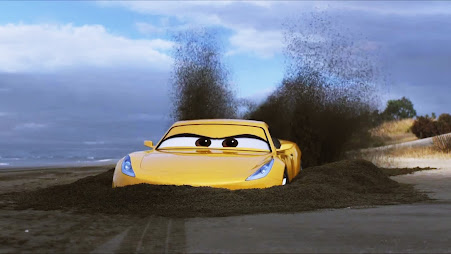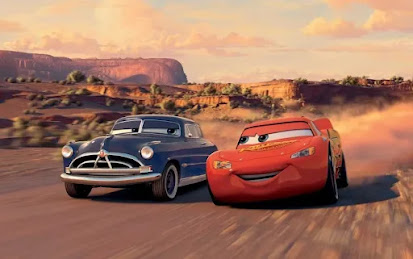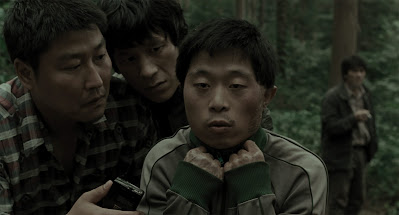Disney's Cars and Whether What You Do Defines Who You Are
I got twin toddlers that recently have had a desire to watch the movies and show from the Cars franchise on repeat. Watching those movies over and over and over and over gets you asking questions about this odd alternate history just to stay sane. There's a World War II jeep living in Radiation Springs... was there a World War II in this world? Mater has a throw away line of "I bet this is smoother than the roads on the moon"... did the world make it to the moon? Are there actual roads on the moon? The forklifts only ever appear while labor is being done... are they an underclass? Would a Russian Revolution in this world be organized by this underclass? Was Lenin a forklift?
But one that really ate at me once I started thinking about it revolved around the character Sheriff. The character is a 1949 Mercury Eight police car and his entire personality is basically "I'm a rural lawman." So, the question is... was Sheriff destined to be a cop and have the personality of a stereotype because he was manufactured a Mercury Eight in 1949? The more I chewed on those questions I started asking whether the characters in the movies actually ask the same questions of one another. In the first Cars (2006), Lightning incredulously asks of Doc Hudson "So you're a judge, a doctor, and a racing expert?" when Doc gives him some advice, supposedly surprised that Doc can be not just one thing but three. He also is very upset about being asked to do anything pertaining to road maintenance as he explains simply over and over that he's a racecar - he doesn't fix roads. Now, this can be played off as a pampered celebrity just being upset over manual labor but I feel there's more to it there.
In Cars (2006), Lightning is trying to be the best racecar ever - it is ingrained to how he thinks about who he is. He's adored by countless fans but struggles to give twenty names of actual friends when asked to. He has thrown everything into being the best he can be that he has burned anyone that might get close, even a support network of a crew team. When forced with the reality of needing to slow down while in Radiation Springs Lightning finally has a chance for introspection of what he really wants in life. Does he want to be the best? Or does he want more to life? Enter Doc Hudson, his antagonist for the second act. When Lightning finds out Doc was also a racecar, he's confronted with more emotions than he knows what to do with - awe that he's found this racing legend, obviously a personal hero of his, but dumbfounded confusion that he vanished from the racing world to be here in podunk Radiation Springs. Lightning is then given a fork in the road - continue the path he was on towards guaranteed success, though most likely lonely; or expressing empathy and possibly losing the chance to win the trophy. He chose the latter.
Let's skip Cars 2 (2011) - even my toddlers have enough taste to skip it - and move on to Cars 3 (2017). This movie is more of a "two-header" focusing on both Lightning dealing with forced obsolescence from a new breed of racecars outpacing him as well as on Cruz Ramirez, his trainer who also is trying to figure out where she fits in all this. While the lesson of the first film stands and Lightning isn't a jerk pushing others away, he's still able to successfully be a racecar. Once he begins to feel pushed out of the opportunity to win, it shatters his sense of self. In order to improve his speed, he's paired with Cruz who is a little green as a racer but has talent to the point that she becomes a racing partner that is able to consistently beat Lightning. The loud part of this film is "who is Lightning" for the first half with the quiet part being "who is Cruz," which gets louder as we speed into the third act.
 |
| Cruz having some issues driving on sand. |
The part about Cars 3 I love the most, which really raises questions on identity being tied to what you do is this wonderful set piece in the second act around Thunder Hollow at a Demolition Derby. I love that bit so much. It's filled with fun, hilarious action and introduces a great cast of characters, most notably an ambulance called Dr. Damage, a converted recreational vehicle that has a gear loose, and Miss Fritter - a customized school bus to wreck carnage on anything in her wake. There's also tons of other cars, including a cop car, a taxi, and the obligatory Pizza Planet truck from Toy Story (1995) in a blink and miss it cameo. But it's Miss Fritter that I want to focus on. A first impression is kind of shock that Demolition Derby exists in the world of Cars as these are basically cars slamming into each other until destroyed. While it's played a little bit like pro wrestling, the damage seems to be real - these vehicles are all dented and cut up, one of which is comically and permanently bent up and can't go that fast. So why would a school bus stop being a school bus and purposefully get slammed into nightly? Because she's a celebrity here! She's the main face of this show! Everyone cheers for her!
 |
| You're in for it now, Whipplefilter! |
Now what path brought Miss Fritter specifically from the Lower Bellevue County Unified School District to Thunder Hollow is a story probably left unsaid but it's still a fascinating one. Just as the story that brought an ambulance to have "Dr Damage" and "Rambulance" spray painted on their side, driving around vocalizing their own siren as they slam into other cars. What matters is they're here. They run each other down before a large audience that loves them, and then they all get beers afterwards and sing "Caraoke." The thing that I walk away with from the Demolition Derby section of Cars 3 is that there's a found family here. For whatever reason all these random cars made the conscience decision to leave their previous jobs - the ones they may have been strictly manufactured for - in order to be entertainers. Whether they left out of choice or were pushed out in a similar story that Lightning is facing now is irrelevant. What matters is that they found a new place despite their original manufactured destiny. It didn't define who they were - they found their own definition.
So it's on my fifteenth viewing of Cars 3 that I find myself thinking about how that relates to me, right? Am I more than what I do? How much of my identity is tethered to my career? That's my own personal journey but strangely enough because of this odd franchise of films I started asking, even subconsciously, how much had I defined my identity and self-worth to what I do and how well I do it. I was able to start to untangle that knot of anxiety knowing that if I really need to, I could go off and find my own Thunder Hollow somewhere. Hell, that's kinda what I'm doing with this writing.
So Sheriff could probably leave Radiation Springs if he wanted to. Just as he has the freedom of that decision he also has the freedom to wallow in the comfort of familiarity of his home doing a job he probably finds comfort in (though ACAB includes Sheriff in Cars). Anyways, this is just the random thoughts one gets when subjected to Cars and Cars 3 ad nauseam. These themes are even touched in that new Cars on the Road television show, but I'll let you drive down that path on your own and discover them.



Comments
Post a Comment